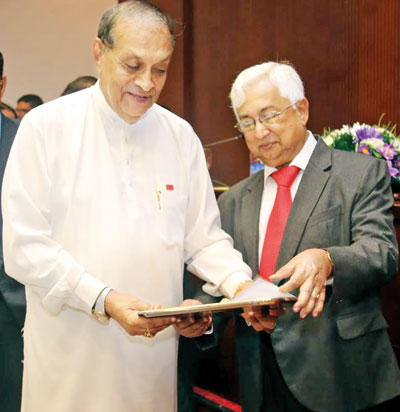Sri Lanka’s public procurement to be streamlined, made more transparent
View(s):
Parliamentary Speaker Karu Jayasuriya and Commission Chairman Nihal Wickramasuriya launching the website.
Sri Lanka has taken major strides towards enhancing the effectiveness, efficiency and transparency in the public procurement system making it more accountable, streamlined and cost effective.
In this endeavour, National Procurement Commission (NPC) has devised an Action Plan, which will contribute to the efforts of the government financial management reforms.
The Commission was established under the 19th Amendment to the Constitution in the latter part of 2015 with the aim of taking measures towards streamlining the existing public procurement system
The launch of the ‘Action Plan’ and the website of the NPC took place at a ceremony held at the BMICH in Colombo on February 27 under the patronage of Parliamentary Speaker and Chairman of Constitutional Council Karu Jayasuriya.
According to latest Finance Ministry statistics, the Sri Lankan government spent approximately Rs. 597 billion through public procurement in 2015, which is about 26 per cent of total Government expenditure.
Mr. Jayasuriya noted that the NPC has been entrusted with the task of preventing the waste of public money and the wealth of this country by implanting proper procurement process in purchasing goods and services for public institutions.
In the past tenders of public institutions were marred by manipulation, favouritism and corruption, he said adding that the Commission has the responsibility of monitoring the whole public procurement process ensuring good governess.
The loss of good governance in public procurement has caused serious long term issues to economic management especially implementing politically motivated unsolicited proposals-based procurement activities, he added.
“This plan has been developed by the NPC with the assistance of Short term Assistance to Improve Public Financial Management Reform (STAIR) project under the USAID Sri Lanka Reform Agenda (SLRA),” Nihal Wickramasuriya, Chairman of the Commission, said.
It sets out a consistent template for public bodies to follow and seeks to ensure that purchasing decisions will be informed by proper consideration of all the social, economic and environmental impacts – and benefits – relevant to the goods and services, works, consultancy services and information systems.
A significant impact in budgetary savings is expected to be made with the introduction of the e-government procurement on the directions of NPC, he added.
E- Government procurement involves the use of electronic systems to handle any or all steps of the procurement process, from online publication of tender notices, supplier registration and e-submission of bids. It results in cost savings both for Government entities and suppliers.
“Introducing an e-procurement platform can significantly enhance the transparency, fairness and efficiency of Sri Lanka’s public procurement process while ensuring a reasonable operating environment for suppliers,” he said.
The ADB, World Bank and other development partners have expressed willingness to provide technical assistance to implement action plan for the public sector in Sri Lanka.
The main mandate of the Commission is to prepare fair, equitable, transparent, competitive and cost effective guidelines and procedures for public sector procurement process
The NPC is now formulating proper procedures and guidelines for the procurement of goods and service, works, consultancy services and information systems of government institutions.
“These guidelines are being prepared in accordance with international best practices and with the assistance of international donor agencies to fulfill the needs of the country,” Mr. Wickremasuriya said revealing that it will be introduced by mid this year.
“Views and suggestions of Ministry Secretaries and other stakeholders were incorporated in the set of guidelines after in-depth consultations, compromise and consensus among them,” he disclosed.
A National Procurement Strategy will also be introduced in line with the macroeconomic objectives, targets and priorities of the country.
One of the main functions of the NPC is to monitor and report to the appropriate authorities, on whether the procurements by government institutions are based on procurement plans prepared in accordance with previously approved action plans.
The Commission will look into the aspect of whether all qualified bidders have been afforded an equal opportunity to participate in the bidding process for the provision of those procurements.
It will also focus attention on the procedures for the selection of contractors, and the awarding of contracts for the provision of goods and services, works, consultancy services and information systems to government institutions are fair and transparent.
The NPC has to report on whether members of Procurement Committees and Technical Evaluation Committees relating to procurements undertaken by government institutions are suitably qualified; and investigate reports of procurements made by government institutions outside the established procedures and guidelines, and to report the officers responsible for such procurements to the relevant authorities for necessary action.


